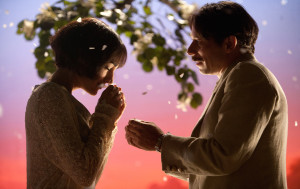
“I don’t think I would be very happy having two dogs, three kids, a house, a car and an evening supper – I would be the most miserable person in the world!”
I’m seated across from acclaimed graphic novelist and filmmaker Marjane Satrapi in a smoky (thanks to her) suite in San Francisco’s ritzy Fairmont Hotel. The author of the autobiographical “Persepolis” is every bit an extension of the outspoken, headstrong young heroine portrayed in the books, so I suppose it should be no surprise that our conversation, which began with her latest film “Chicken with Plums,” has gradually migrated into uncharted territory, encompassing death, creativity and, at the moment, the American Dream. Satrapi, as I quickly discover, has an opinion on everything.
“What is happiness?” she mused. “That happiness is to have a car and a beautiful house…this is the image that [America is] selling us. And sometimes, I have to admit, this American way of living is really boring.”
Those familiar with “Persepolis” will know that Satrapi has lived anything but an ordinary life. Born and raised in 1970s Tehran by political activist parents, she witnessed firsthand the effects of the Iran-Iraq War. After receiving her high school education in Vienna, Satrapi returned home to attend university before leaving Iran for good in her twenties and settling in France, where she currently resides.
The volumes depicting her early life were adapted into the successful 2007 film “Persepolis,” which Satrapi wrote and co-directed. And while this level of creative control would probably seem like a dream come true to most writers, the way Satrapi tells it makes auteurism seem oddly fortuitous.
“‘Persepolis’ [the film] was not my idea,” she said. “I never wanted to make cinema at all. It was a friend of mine, who wanted to become a producer, [who] said ‘Let’s adapt that!’”
“The language of cinema is very different from the language of books,” she continued. “At the same time, there was a small voice in my head saying, ‘They’re going to give you a couple million dollars – are you dumb to say no?’
“And I really did everything for this film not to happen,” she added. “I [insisted] that the film be black and white, hand drawn, etc., and then they said yes to all of it. And then I was like, ‘Shit! Now I have to do it.’ But I [actually] had lots of fun.”
“Chicken with Plums,” the live-action, magical-realist adaptation of her 2004 graphic novel of the same name, reunites her with co-director and fellow artist Vincent Paronnaud. The story centers around a talented musician – loosely based on a late relative – who loses his will to live after his wife breaks his beloved violin in a fight.

“I [had] just seen a picture of the uncle of my mother, and he looked extremely [handsome] and melancholy,” recalled Satrapi. “And that was a moment in my life that I was very, very obsessed with the idea of death and art and love and life, etc., etc.
“But the only thing I [knew] about this man was that he was a great musician. So what is true [in the film] is that, and the rest…are things I have made up.”
The protagonist of the film is married with two children but, as we later learn, never fully recovered from losing his first love as a young man. His mentor encouragingly claims that pain and suffering foster creativity, but Satrapi insists that this was more for satirical effect than anything else.
“I don’t think suffering is necessary for creation,” she said of her experience as an artist. “But I have to admit that the day that I wake up [feeling pretty], and the sun is shining, and I’m very happy – this is not the day that I go to my studio and create something.”
Speaking candidly of the surprising turns in her career path, Satrapi maintains an admirable open-mindedness toward the future.
“Everybody thinks [having an artistic life] is cool, but you have to understand that when you work as an artist, there are years that [you] don’t make one penny,” she said. “If I have no security, then at least I have the freedom to do things that I like. So right now I feel like making cinema. Maybe in two years I might want to become a dancer. Who knows?”
One thing is certain, however: Even if she continues to write, we shouldn’t expect any more movie adaptations.

“Economically, it’s interesting,” said Satrapi, “But for the brain, it’s very boring, so I would never do it again.”
“Chicken with Plums” opens in theaters later this summer.
